The Weblog

Athens Locally Grown has closed.
Availability for July 29
To Contact Us
Our Website: http://athens.locallygrown.net
On Twitter: @athlocallygrown
On Facebook: http://facebook.com/athenslocallygrown
Recipes
Broiled Eggplant with Crunchy Parmesan Crust
This is such an easy way to make a crunchy-crusted eggplant appetizer that you may even feel guilty about the raves it receives. Top with tomato sauce for an extra layer of flavor. From Farmer John’s Cookbook: The Real Dirt On Vegetables.
oil for greasing the baking sheet
mayonnaise
eggplant, cut into 1/4-inch slices
freshly grated Parmesan cheese (about 1/2 cup)
1. Preheat the broiler. Lightly oil a baking sheet.
2. Spread mayonnaise sparingly on both sides of each eggplant slice, then dip the slices in the grated Parmesan cheese, thoroughly coating both sides.
3. Arrange the slices in a single layer on the oiled baking sheet and place under the broiler until golden brown, about 3 minutes. Flip the slices and broil until golden brown and crunchy on top and the eggplant is soft, about 3 minutes more
Coming Events
Farmer for a Day: August 7, Saturday, at Flatwoods Farm (Elbert County)
“USDA Certified Organic. We are located in the Flatwoods area of south Elbert County. One of the goals of local sustainable agriculture is to grow crops befitting the culture, the land and the nature of a given area. We specialize in growing organic fruits and vegetables that are best suited for the consumers, retail outlets, markets and restaurants of northeast Georgia and the surrounding area. We concentrate when possible on producing heirloom varieties and raise all our crops in the ground, no hydroponics or container produce.” There are slots still available for both our August and September Farmer for a Day events, and you can find more details on all of them on the Market page of the website, under the Event Reservations category.
Athens Locally Grown Hunter’s Moon Feast: October 23, Saturday, at Boann’s Banks (Royston, Franklin County)
“The October full moon has been known as the “Hunter’s Moon” for millennia, and was a time of feasting throughout the Northern hemisphere. We revive the notion here with a day of feasting at Boann’s Banks (the farm of Athens Locally Grown managers Chris and Eric Wagoner) on the banks of the Broad River outside Royston. It’ll be a low-key affair, without any farm work for you to do. Just good food and drink (Eric will prepare a variety of dishes using locally grown vegetables and locally raised meats, and perhaps brew an adult beverage. There’s also the possibility of home-brewed beer, and the likelihood of good live music. There’ll certainly be good company (all of you), and a river to splash in. There’s even some camping space, for those who really want to enjoy the moon. Come any time, but I’ll be aiming for 2pm to have the BBQ and other dishes ready. Stay as long as you’d like, even into Sunday. Nights are chilly, though, so bring a tent if you’re wanting to do that. There is no charge for Locally Grown members and their families. We do ask that you bring a dish to share, and if it’s made from Locally Grown ingredients, so much the better." You can make your reservations for the feast on the Market page of the website, under the Event Reservations category.
The Athens Farmers Market is held every Saturday morning at Bishop Park from 8am to noon and every Tuesday evening at Little Kings downtown. It’s a totally separate entity from Athens Locally Grown, but you’ll find many of the same growers at both. And of course, you can learn more about that market on their website.
Please support your local farmers and food producers, where ever you’re able to do so!
Market News
First off this week I wanted to give you a heads up about the paperwork we’ve been printing out each week. I’ve been working over the past several months on an electronic system that our volunteers can use to fill orders so we wouldn’t have to print so much paper. During our last record week, back in early May, we printed almost 750 pages, all of which we sent straight to the recycling bin at the end of the day. We’ve been doing that week in, week out for years, and it added up to far more paper than I even want to think about. Not only did we print your invoices, which we used to pack the order, but we also had a condensed version of them all for the payment table and another report with much of the same information we used to check in the growers.
The folks at Ben’s Bikes let us use their internet service, so the first thing I did was add a grower check-in system to the website’s back end. Then, using some iPads that I borrowed (and one the market bought), we were able to get the payment table using the website as well. In the process, we were able to add a second cashier, eliminating our biggest bottleneck. We were donated some old iPhones to help us test filling the orders electronically, and that has worked really well. I found a great deal on some refurbished iPod Touches a couple days ago, so when those arrive we’ll be able to go 100% paperless. It’s a huge relief for me to get us to that point. I just hated to see all that paper going into the recycle bin every single week.
So, what does that mean for you? First of all, we won’t have a paper receipt for you take home with you. FEw of you asked for it, but I know for those of you who did it was very important. Those invoices have always been available to you on the website, and they will still be there. These are the exact same things we printed out Thursday afternoon. You’ll find them on the Your Account page of the site, under “Your Order History”. There, you’ll see you can generate an invoice for every order you’ve ever placed. The growers are adjusting orders throughout the week to account for things they couldn’t fill, but they are done by 2pm on Thursday. Any time after that, your invoice is pretty much final, and reflect what we expect you to get when you arrive that afternoon. You can view or print that any time you need to.
There are occasionally adjustments we need to make on the spot, however, so that’s the second thing. Since our volunteers will be filling your order electronically, and since the cashiers will be seeing that same information, we’re going to ask that you not pay until after you’ve received your items. That way, if we need to make any adjustments on the spot (usually either due to the grower accidentally leaving something out or us making a mistake getting the right items to the right people), the cashiers will already have that info on their screen when they give you your total. Paying first, then getting your items, and then making refunds/credits has been a bit confusing for everyone.
We’ll still have the paperwork for another week or two, but it will soon be a thing of the past.
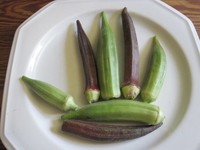 |
 |
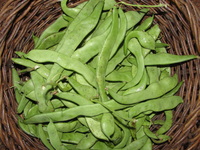 |
The two week long “Taste Your Place” celebration of Athens’ thriving local food system organized by P.L.A.C.E. culminated yesterday with the awarding of the Athens Local Food Awards. The Athens Local Food Awards are an acknowledgement of those who are working hard to create a strong, accessible local food culture in Athens. The awards are presented in four categories.
The first award is the “Excellence on the Farm” Award. We love all the farms we have around Athens. But for this category we want to acknowledge the farms that go the extra mile by raising the standard of farms in our area, reaching out to individuals to teach them about farming, and/or developing innovative farming techniques or business models.
The 2010 Excellence on the Farm Award was presented to Backyard Harvest. Backyard Harvest has been providing Athens with sustainably grown produce on an 18 acre farm in Oglethrope County since 1995. Boo and Becky have over 25 years farming experience between them and have been mentors to many a local farmer. Anyone who knows local food in Athens knows Boo.
The second award is the “Excellence in Education” Award. All educators work hard balancing teaching requirements with the individual needs of their students. Below is a short list of educators who have caught out attention as seeing the need to get their students outside of the standard classroom environment to learn about protecting our natural world, serving our community, and growing food. If you know of an educator who should be on this list, please write in their name to cast a vote for them.
The 2010 Excellence in Education Award was presented to David Berle. Berle is a UGA Horticulturalist who brings a wealth of knowledge to his classroom from his experiences as a county extension agent, nursery grower, landscape contractor and horticulturist for both the State Botanical Garden of Georgia and the UGA Grounds Department.
The third award is the “Excellence in Business” Award. With the local food scene booming in Athens, a few local businesses have helped raised the awareness of local food and/or increased the availability of local food to the Athens community.
The 2010 Excellence in Business Award was presented to Daily Groceries Co-op. Open to all, this Athens staple helps shoppers looking to buy high-quality, organic groceries, produce, supplements and lots more since 1992. Daily tries to keep locally grown goods stocked when possible but always lets you know where their food is coming from.
The final award is the “Excellence in Advocacy” Award. Building a local food culture requires the dedication of many people working hard at many levels. The individuals below are a few of the early advocates and movers-and-shakers of Athens burgeoning local food scene.
The 2010 Excellence in Advocacy Award was presented to Hugh Acheson. Hugh cooks contemporary American soul food as executive chef at Five & Ten in Athens, Georgia. In 2004 he also opened Gosford Wine, and in August 2007 he added the National, a restaurant serving a Mediterranean menu. Hugh is one of the local food pioneers in Athens, supporting local farmers who showed up on his doorstep looking to sell produce and serving local food to his customer, before almost anyone else in Athens.
It is important to state that the Athens Local Food Awards are not a competition. There is no best farm, educator, business, or advocate. The vibrant local food scene that Athens enjoys today is due to countless people working on many levels over the course of many years. It is impossible to recognize everyone, but we feel that it is important to create a space where we can recognize a few outstanding individuals each year.
In other news, several of you noticed the return of raw milk to Athens Locally Grown last week. No, we haven’t yet won our lawsuit against the FDA. Gooneybush Dairy is an Athens (very) small goat dairy, licensed by the state of Georgia to sell raw milk for pet food. So, if your pets have been needing raw goat’s milk from a good, clean local source, you can now order that through Athens Locally Grown.
Due to some logistical conflicts, both Split Creek Farm and Mac’s Eggs will be going to an every-other-week schedule through the end of August. They are listing this week, so if you’re a regular customer of either farm, get two week’s worth now, because they’ll be unavailable again next week.
We’ve re-instated our regular “Meet the Grower” table during the Thursday pickups. This week Blackbriar Farm will be manning the table. Blackbriar sells an eclectic mix of products including dog treats, worm composting bins, fruitfly traps, firewood, and other products made or grown on their farm. While you’re waiting for us to fill your order, step up to the table and say hi!
Thanks so much for your support of Athens Locally Grown and everything we’ve tried to accomplish. With you’re help, we’ve been able to build something truly great and inspirational to people all across the country, more than you could know. Thank you also for your support of all of our growers, local food, and our rights to eat it. You all are part of what makes Athens such a great area in which to live. We’ll see you on Thursday at Ben’s Bikes at the corner of Pope and Broad Streets from 4:30 to 8pm!
We thank you for your interest and support of our efforts to bring you the healthiest, the freshest and the most delicious locally-produced foods possible!
Availability for July 22
To Contact Us
Our Website: http://athens.locallygrown.net
On Twitter: @athlocallygrown
On Facebook: http://facebook.com/athenslocallygrown
Recipes
Homemade Refrigerator Pickles
“Just pickles!!! These are easy to make, and are a great way to use vegetables from the garden.” From allrecipes.com
Makes 8 Cups
1 cup distilled white vinegar
1 tablespoon salt
2 cups white sugar
6 cups sliced cucumbers
1 cup sliced onions
1 cup sliced green bell peppers
1. In a medium saucepan over medium heat, bring vinegar, salt and sugar to a boil. Boil until the sugar has dissolved, about 10 minutes.
2. Place the cucumbers, onions and green bell peppers in a large bowl. Pour the vinegar mixture over the vegetables. Transfer to sterile containers and store in the refrigerator.
Market News
Right now we’re at the peak of the summer season. In a few weeks, it’ll probably be too hot for most flowers to set fruit, cutting down on the availability for a while. But for now, we’re awash in summer flavors. I see 95 listings for tomatoes, 50 for peppers, 27 of garlic, and even 11 of okra. The blueberries will be gone in a week or two, but for now there are plenty. And on and on, down the list. So much variety, so many things to try. If you’re like me, you can’t help but to gorge on your favorites and try as many different things as you can, before they’re gone. Eating locally grown foods means for the most part eating with the seasons, and when the seasons change, our available foods do too.
That doesn’t mean when the weather turns cool we have to go without, though. I’ve been enjoying the bicolor corn from McMullan Family Farm so much, for example, that last week, for the first time, I canned about a bushel of corn. Turns out it was really easy (well, once I bought an OXO corn stripper for under $10), and it’s probably something I’ll be doing every summer now. Yesterday I turned about ten pounds of Roots Farm cucumbers and Sundance Farm onions into a bunch of jars of bread and butter pickles. That took no time at all (other than waiting along the various steps), and the hardest part was slicing all the cucumbers. Today I froze a gallon or more of Jim’s Farm blueberries. Next month I’ll can a bunch of Mills Farm roma tomatoes. As soon as my favorite poblano peppers from Backyard Harvest are ready, I’ll roast and freeze as many as I can afford. I know it sounds like I must have a root cellar full of shelves of jars, but really it’s not like that at all. I don’t try to put enough food away to be able to live off of it all winter, but instead just enough of my favorites to be able to break open a jar now and again when I get a craving for sweet corn, or blueberry crisp, or strawberries. By spending a few hours here and a few hours there throughout the summer, I can enjoy the labors of my farmers even if their fields are fallow.
Most home canners know this already, but it might be surprising to you: UGA is recognized as being the expert on home food preservation. Pretty much every canning recipe has its roots in the National Center for Home Food Preservation, located on campus. If you’ve heard old stories about jars exploding, or making people ill, or whatever, well, the folks at UGA have made that a thing of the past through scientific testing and the development of easy to follow fool-proof recipes for preserving pretty much anything that can be preserved, whether you’re canning, smoking, freezing, fermenting, or what have you.
Building on that knowledge, people have written many cookbooks that take the functional recipes from UGA and embellish them in ways that transform an ordinary jar of pickles (for example) into something really quite special. One of those books is “Canning for a New Generation” written by Athens author Lianna Krissoff. She had a book signing at Gosford Wine (former home to Athens Locally Grown) last Thursday. Of course I was at ALG instead, but I can’t wait to get my hands on a copy and try some of her recipes out. If you’ve never tried preserving some of our locally grown bounty, don’t be intimidated. Start small, and you’ll see how great it is to have a taste of summer in December.
 |
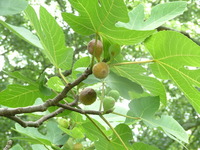 |
 |
And now, on to other news…
Due to some logistical conflicts, both Split Creek Farm and Mac’s Eggs will be going to an every-other-week schedule through the end of August. This is an off-week for both of them, but they’ll return next week.
If you’ve got an old iPhone or iPod touch lying around you don’t need, would you consider donating it to us? With the two iPads we have at the pay table and if each of the six volunteers filling orders had an iPhone or iPod touch, we will save a ream of paper a week. That’s a lot of paper, and it adds up fast. Not only that, but doing everything live on the website has really helped us cut down on the errors that we sometimes make filling orders, and at the very least makes sure you get a proper refund when we do leave something out. It’s also greatly cut down on the behind-the-scenes work I do keeping all the books in order. It doesn’t matter how old it is. We’ve been given three of them, one of each model Apple of iPhone has made, and all three do exactly what we need. One even has a cracked screen! Only three more, and we can go entirely paperless. Thanks!
We’ve re-instated our regular “Meet the Grower” table during the Thursday pickups. There’s not currently a grower signed up for this week, but we’ll try to get somebody there on Thursday. While you’re waiting for us to fill your order, step up to the table and say hi!
Thanks so much for your support of Athens Locally Grown and everything we’ve tried to accomplish. With you’re help, we’ve been able to build something truly great and inspirational to people all across the country, more than you could know. Thank you also for your support of all of our growers, local food, and our rights to eat it. You all are part of what makes Athens such a great area in which to live. We’ll see you on Thursday at Ben’s Bikes at the corner of Pope and Broad Streets from 4:30 to 8pm!
Coming Events
Farmer for a Day: August 7, Saturday, at Flatwoods Farm (Elbert County)
“USDA Certified Organic. We are located in the Flatwoods area of south Elbert County. One of the goals of local sustainable agriculture is to grow crops befitting the culture, the land and the nature of a given area. We specialize in growing organic fruits and vegetables that are best suited for the consumers, retail outlets, markets and restaurants of northeast Georgia and the surrounding area. We concentrate when possible on producing heirloom varieties and raise all our crops in the ground, no hydroponics or container produce.” There are slots still available for both our August and September Farmer for a Day events, and you can find more details on all of them on the Market page of the website, under the Event Reservations category.
- Athens Locally Grown Hunter’s Moon Feast*: October 23, Saturday, at Boann’s Banks (Royston, Franklin County)
“The October full moon has been known as the “Hunter’s Moon” for millennia, and was a time of feasting throughout the Northern hemisphere. We revive the notion here with a day of feasting at Boann’s Banks (the farm of Athens Locally Grown managers Chris and Eric Wagoner) on the banks of the Broad River outside Royston. It’ll be a low-key affair, without any farm work for you to do. Just good food and drink (Eric will prepare a variety of dishes using locally grown vegetables and locally raised meats, and perhaps brew an adult beverage. There’s also the possibility of home-brewed beer, and the likelihood of good live music. There’ll certainly be good company (all of you), and a river to splash in. There’s even some camping space, for those who really want to enjoy the moon. Come any time, but I’ll be aiming for 2pm to have the BBQ and other dishes ready. Stay as long as you’d like, even into Sunday. Nights are chilly, though, so bring a tent if you’re wanting to do that. There is no charge for Locally Grown members and their families. We do ask that you bring a dish to share, and if it’s made from Locally Grown ingredients, so much the better." You can make your reservations for the feast on the Market page of the website, under the Event Reservations category.
The Athens Farmers Market is held every Saturday morning at Bishop Park from 8am to noon and every Tuesday evening at Little Kings downtown. It’s a totally separate entity from Athens Locally Grown, but you’ll find many of the same growers at both. And of course, you can learn more about that market on their website.
Please support your local farmers and food producers, where ever you’re able to do so!
We thank you for your interest and support of our efforts to bring you the healthiest, the freshest and the most delicious locally-produced foods possible!
Availability for July 15
Once again I’m writing this from the road, and will pass on the usual recipes and photographs in the interest of getting this to you sooner. This time, I’m in College Station, Texas, doing some work for my day job. As much as I’d like to farm and manage Athens Locally Grown full time, I do have a regular office job that keeps me pretty busy, and so here I am.
It would have been a good week to stay in Athens, as the annual “Taste Your Place” celebration kicked off yesterday. If you’ve not heard of this two-week festival of Athens’ local food system, that’s ok… it’s only in its third year. Put on by P.L.A.C.E., this series of events packs more into two weeks than pretty much any other festival I’ve seen. There are restaurant testings, films, lectures, book discussions, awards, cooking contests, pot luck meals, and more. It’s really quite a lineup, and I encourage you to attend one or more of the events. You can find out more at their website, and the breadth of what P.L.A.C.E. has been able to put together is a testament to how vibrant and mature our food system has become in a few short years, to the point that Athens Locally Grown is just one small part of a much larger whole.
Today was our July Farmer for a Day event, held at Veribest Farm. Unfortunately my flight left too early for me to attend, and I’d been looking forward to his tour all year. Our next one, scheduled for Saturday August 7th, should be an interesting one too. It’ll be held at Flatwoods Farm in Elberton. The farm is run by a recently retired UGA physics professor and his wife, and is USDA certified organic. They’re still small and in the start=up phase (and so only occasional have offerings through ALG), and should be a great introduction into what it takes to start a small scale USDA certified vegetable farm. There are slots still available for both our August and September Farmer for a Day events, and you can find more details on all of them on the Market page of the website, under the Event Reservations category.
Our “Meet the Grower” table will be manned this week by Daniel Dover of Darby Farms. Daniel hosted our first “Grower for a Day” event of the season. This beautiful article in the Flagpole (and this short YouTube video) came out of that event. He’ll love to talk with you about what he does at his farm and why he’s so passionate about it, so please stop and say hello while you’re waiting for us to fill your order.
Due to some logistical conflicts, both Split Creek Farm and Mac’s Eggs will be going to an every-other-week schedule through the end of August. Several of you noticed they weren’t listed last week, and I apologize for not giving you more notice. If you’re a regular customer of either farm, get two week’s worth now, because they’ll be unavailable again next week.
If you’ve got an old iPhone or iPod touch lying around you don’t need, would you consider donating it to us? With the two iPads we have at the pay table and if each of the six volunteers filling orders had an iPhone or iPod touch, we will save a ream of paper a week. That’s a lot of paper, and it adds up fast. Not only that, but doing everything live on the website has really helped us prevent the errors that we sometimes make filling orders, and at the very least make sure you get a proper refund when we do leave something out. It’s also greatly cut down on the behind-the-scenes work I do keeping all the books in order. It doesn’t matter how old it is. We’ve been given three of them, one of each model Apple of iPhone has made, and all three do exactly what we need. Only three more, and we can go entirely paperless. Thanks!
The Athens Farmers Market is held every Saturday morning at Bishop Park from 8am to noon and every Tuesday evening at Little Kings downtown. It’s a totally separate entity from Athens Locally Grown, but you’ll find many of the same growers at both. And of course, you can learn more about that market on their website.
I forgot about the time zone difference, and just realized it’s going to be midnight there before too much longer, so I’m going to stop right now and just open the market already. Thank you for all of your support of Athens Locally Grown and our member growers. Without your patronage and demand for locally grown and naturally grown foods, the growers wouldn’t be here to meet that demand, and our entire community would be much worse off. Thank you! We’ll see you on Thursday from 4:30 to 8pm at Ben’s Bikes, at the corner of Pope and Broad!
Availability for July 8
Happy Independence Day to everyone out there! Today is the day we celebrate our independence from the tyranny of a king, but it’s also a great occasion to think about our independence from all sorts of things. Your support of Athens Locally Grown greatly helps the cause of food independence for our community, for starters. Did you know that, on average, American farmer receives only nine cents out of every dollar that gets spent on food? By the time you take out the cut of the processors, the distributors, the wholesalers, and so forth, only 9% is left for the farm. And of course, they’ve got to try to meet all of the expenses of running a farm with that money, and pretty much the only way to do that is by consolidating the farmland into huge “corporate” farms that can get by with the economies of scale. The farms might be independent family-owned enterprises on paper, but they’re beholden to all of those other interests that control the other 91% of the food dollar. Here at Athens Locally Grown, the growers keep 90% of every dollar, turning small, truly family owned and operated farms into viable businesses. That fosters variety for you, provides a sustainable use of the area’s green space, and helps in no small way Athens be a more self-reliant community.
For you, too, these growers and their products let you become independent from the corporate grover, who is told by the corporate office in Cincinnati or Bentonville or Greenville what they can and can’t stock and who they can source their produce from. You’re given the freedom to choose who grows and produces your food and how they grow and produce it. If you don’t like one grower’s products or methods, you have a hundred others, all located right here, to choose from.
And of course by sourcing your food so close to home, you don’t have to be reliant on an overtaxed and under-vigilant inspection system to make sure your food is safe. The Federal government is actively trying to reduce your ability to choose where your food comes from, so not everything is rosy. I’m a plaintiff in a Federal law suit against the FDA resulting from the raw milk incident last fall. You may recall that state gents seized milk from our Athens Locally Grown pickup point in October, and then a few days later the state came out to my home and, under the direction of an FDA agent who was present, ordered all of the milk to be destroyed. Last week, in a court filing, the FDA called my affidavit where I recounted the events of that day “bizzare allegations” and denied that the incident ever happened. That may come as a surprise to those of you who came out to my houe that day and witnessed it, but there we are. Our fight for independence is an ongoing one.
I could go on, but this has already gotten long. I’m typing all this on my phone while my wife drives us back from watching fireworks in Greenville, SC. Please excuse any typos; it’s easy to type, but not so easy to proofread.
Speaking of typing on my phone, we tried out an order checkout system on some old iPhones last week. We’ve only found two, but it worked well enough that we’re now looking for more. If you’ve got an old iPhone or iPod touch lying around you don’t need, would you consider donating it to us? With the two iPads we have at the pay table and if each of the six volunteers filling orders had an iPhone or iPod touch, we will save a ream of paper a week. That’s a lot of paper, and it adds up fast. Not only that, but doing everything live on the website has really helped us prevent the errors that we sometimes make filling orders, and at the very least make sure you get a proper refund when we do leave something out. It’s also greatly cut down on the behind-the-scenes work I do keeping all the books in order.
Our next Farmer for a Day event, on Sunday July 11, at Veribest Farm, has just about filled up. There are slots still available for our August, and September Farmer for a Day events, and you can find more details on all of them on the Market page of the website, under the Event Reservations category.
The Athens Farmers Market is held every Saturday morning at Bishop Park from 8am to noon and every Tuesday evening at Little Kings downtown. It’s a totally separate entity from Athens Locally Grown, but you’ll find many of the same growers at both. And of course, you can learn more about that market on their website.
Thank you for all of your support of Athens Locally Grown and our member growers. Without your patronage and demand for locally grown and naturally grown foods, the growers wouldn’t be here to meet that demand, and our entire community would be much worse off. Thank you! We’ll see you on Thursday from 4:30 to 8pm at Ben’s Bikes, at the corner of Pope and Broad!
Availability for July 1
To Contact Us
Our Website: http://athens.locallygrown.net
On Twitter: @athlocallygrown
On Facebook: http://facebook.com/athenslocallygrown
Recipes
Tacos de Quelites — Tacos of Garlicky Greens
There are lots of recipes out there for “authentic” Mexican spinach quesadillas and similar dishes out there. Few of them will tell you, however, that none of those dishes were traditionally made with spinach. It’s a cool weather crop that has trouble growing here in Georgia, much less in the more arid and hot climates further south. What does grow well, both here and there, is the even more nutritious Lamb’s Quarter, and this is what modern recipes replace with spinach.
Makes 8 Tacos
8 to 10 corn tortillas
9 cups (about 1 pound) loosely packed, stemmed lambs’ quarters?
1 tablespoon olive oil?
1 medium white onion, sliced 1/4-inch thick?
3 garlic cloves, peeled and finely chopped?
Salt, about 1/2 teaspoon?
1/4 cup finely crumbled cheese
About 3/4 cup salsa
1. Warm tortillas in steamer, oven, or microwave.
2. Boil greens in salted water until barely tender, about 3 minutes. Drain, cool, and roughly chop.
3. Sear onions in oil until golden brown (about 10 minutes). Add garlic and salt and stir for one minute. Add greens and stir for one minute more. Season to taste.
4. Sprinkle mixture with cheese.
5. Assemble tacos at the table.
Market News
I’ve gone on and on about the variety of produce you can find at Athens Locally Grown. It really is incredible how many types of tomatoes, the arrays of lettuces, the shapes of squash that our growers are able to bring to market each week. And many of them, the heirlooms especially, each have a story, a place of origin, and a specific reason for being grown. Their seeds were passed down from generation to generation for a reason, and we’re very lucky to live in a time where the best varieties from around the world are available to us, their seeds delivered right to your door for planting in your own garden. Civilization has brought us many amazing things, and this one is often overlooked. I’m able to take a bite of an amazing black tomato that was grown for a couple hundred years only in one little community near the Crimean Sea in Russia, and not even bat an eye.
But the foods that have been grown closer to home for even longer often get overlooked too, to the point that many people don’t even know they exist. Take for example the lowly lamb’s quarter, Chenopodium album. For many, it’s a despised weed. It grows quickly in newly disturbed soil, can reach heights of six feet or more, and its seed heads are full of tiny seeds ready to outgrow everything else the next season. Truth is, however, that this was one of the staple foods for North American natives for thousands of years. Its leaves are more highly nutritious than anything else in the garden, even kale. It contains enough vitamin C to prevent scurvy. It’s seeds can be ground into a flour and baked, boiled whole, or rolled like oats (it’s a close relative to amaranth). And it grows everywhere. I took a cooler full to my very first farmer’s market, on May 4th 2002 at Big City Bread. Everyone, the other growers and the customers alike, wondered why the new guy was trying to sell a weed. I gave a lot away that day, but must have convinced enough people, because in future weeks I had trouble bringing in enough to meet the demand. There are several growers this week listing lamb’s quarters at Athens Locally Grown this week, so if you’ve missed your spring spinach in this heat, give them a try!
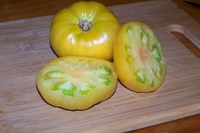 |
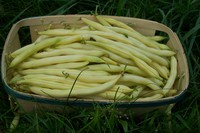 |
 |
There are plenty of other natives that don’t get their due. The fruit of the passion flower, known around here as a “may pop”, are starting to ripen. These little guys look like limes, and grow on a low vine with the most beautiful purple flowers. There are some growing and flowering right now at the courtyard at Farm 255 downtown. They easily open up to reveal individual seed clusters, kind of like a pomegranate. You can suck on the little fruitlets and get a nice sweet citrusy treat. Like real citrus, it’s rich in vitamin C, but it grows right here. Another good source of vitamin C is sumac berries, which are just now turning red. These can be used to make a pink “lemonade”, or ground and used as a tangy meat rub.
These native foods are hard to come by unless you know what you’re looking for, but keep your eyes open! You’ll see them now and again both here and at the other farmers markets.
We’ve re-instated our regular “Meet the Grower” table during the Thursday pickups. This Thursday, David Hoechst, owner of Dragonfly Farm, will be back at the table. He took a turn just a few weeks ago, but it ready to share more with you, especially his heirloom tomatoes. While you’re waiting for us to fill your order, step up to her table and say hi!
Thanks so much for your support of Athens Locally Grown and everything we’ve tried to accomplish. With you’re help, we’ve been able to build something truly great and inspirational to people all across the country, more than you could know. Thank you also for your support of all of our growers, local food, and our rights to eat it. You all are part of what makes Athens such a great area in which to live. We’ll see you on Thursday at Ben’s Bikes at the corner of Pope and Broad Streets from 4:30 to 8pm!
Coming Events
Farmer for a Day: July 11, Sunday, at Veribest Farm (Oglethorpe County)
Certified Naturally Grown. We are pleased and grateful to find ourselves with enough of a patch of soil to participate in Athens Locally Grown and believe in the philosophy of thinking globally and eating locally. We believe in and strive for a sustainable lifestyle that includes growing fine vegetables produced without chemicals while conserving resources. This farm is approximately 33 miles from Athens, and it’ll take 50 minutes to get there. Space is limited, so please make reservations by adding them to your order. You’ll find it under the “Events Reservations” category on the website.
The Athens Farmers Market is held every Saturday morning at Bishop Park from 8am to noon and every Tuesday evening at Little Kings downtown. It’s a totally separate entity from Athens Locally Grown, but you’ll find many of the same growers at both. And of course, you can learn more about that market on their website.
Please support your local farmers and food producers, where ever you’re able to do so!
We thank you for your interest and support of our efforts to bring you the healthiest, the freshest and the most delicious locally-produced foods possible!
Availability for June 24
To Contact Us
Our Website: http://athens.locallygrown.net
On Twitter: @athlocallygrown
On Facebook: http://facebook.com/athenslocallygrown
Recipes
Calabacitas
This recipe is one of my favorite traditional New Mexican dishes, another I adapted from a restaurant menu. On more than one occasion my friends and I biked a dozen miles across the desert to eat lunch at The Coyote Moon in Lemitar. We told ourselves it was for the great green chile cheeseburgers, but those burgers just wouldn’t have been the same without a side of calabacitas. It can be eaten as is for a side dish, but it also makes a great filling for vegetable tacos or burritos.
Serves 4
1 Tbsp. olive oil
1 medium onion, chopped
2 cloves garlic, minced
1 pound zucchini (or yellow squash), cut into 1/2-inch-thick rounds
3/4 cup chopped heirloom tomato
1 diced hot pepper (optional)
1 cup corn kernels
In a large skillet, heat oil on medium heat until hot. Add onion and garlic and cook for three minutes, stirring. Add zucchini and cook three minutes, stirring. Add tomato, pepper, and corn and cook for four minutes, stirring. Serve.
To make a wonderful breakfast, crumble and brown 1 pound sausage. Add sausage and calabacitas to a casserole dish. Sprinkle with 1 cup shredded cheese. Pour two or three beaten eggs over the top of everything. Top with ½ cup bread crumbs and salt & pepper and bake at 325 until bubbly, about 25 minutes.
Market News
This heat has really been something. Every year I seem to get a little less tolerant of it (not a good trait for a veggie grower in the South, I admit), and it seems to have arrived far too early this year. I just took a moment to look back at my records, though, and maybe I’m wrong. Seems to be too much, too soon, either way. We even have okra listed on the website this week, and this has to be the earliest we’ve ever had okra for sale.
So, the Spring greens have just about had it until fall. The tougher cooking greens (made tender via low and slow braising) are plentiful, and the summer crops are all coming quickly. Eggplant has returned, winter squash have come in (so named because they can keep through the winter, but there’s no reason to wait until then to start eating them), and the beans are growing backs just about as fast as they can be picked. I can’t go out to my garden these days without tripping over a five foot long zucchini.
And you know what? I actually prefer them that size. Modern squash varieties, the kind you find in the grocery store, are bred for growing quickly and standing up to shipping stress. That results in a tasteless spongy flesh that has to be eaten when small to get any flavor at all. I’ve noticed just the opposite with many heirloom varieties, however. The Costata Romanesco zucchini I grow develop a fantastic nutty flavor that only gets better the larger they grow. The old Delaware Indian crookneck yellow squash, the kind with the sharp warts, also gets a wonderful complex flavor as it grows. Yes, the area right around the seeds gets spongy and I scoop that out, but the rest of it is fantastic. There is a reason that people have bred them into so many shapes and colors throughout the ages, and it’s not to eat them all when they’re tiny.
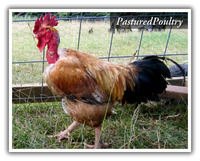 |
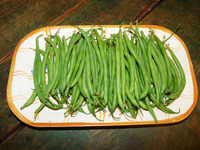 |
 |
Anyway, there is well over a thousand items from our growers available for you to purchase this week. We’ve got some pretty big and fancy grocery stores in Athens, but I can’t think of a single one that can match our variety of fresh food. It really is a testament to all of the hard work our growers have done in the last ten years (many of them for less than that), transforming our landscape both literally and figuratively.
We’ve re-instated our regular “Meet the Grower” table during the Thursday pickups. This Thursday, you’ll get to meet Summer Cordell, owner of Goodness Gracious! Granola. Her profile has this to say: “I started our local granola company in Atlanta, the spring of 2008, and moved the kitchen to Suwanee in 2009. We use local honey, Georgia sorghum, as well as other natural and organic ingredients. This year we began using safflower and/or coconut oil instead of canola.The flavors are amazing. Our granolas are 60-80% organic, no preservatives, no refined sugars, no salt. We also flavorfully roast cinnamon almonds, rosemary pecans and lime-spice cashews, and on occasion, have made the best almond coffee toffee available! We are currently changing our packaging to a compostable package made from recycled material.” While you’re waiting for us to fill your order, step up to her table and say hi!
Thanks so much for your support of Athens Locally Grown and everything we’ve tried to accomplish. With you’re help, we’ve been able to build something truly great and inspirational to people all across the country, more than you could know. Thank you also for your support of all of our growers, local food, and our rights to eat it. You all are part of what makes Athens such a great area in which to live. We’ll see you on Thursday at Ben’s Bikes at the corner of Pope and Broad Streets from 4:30 to 8pm!
Coming Events
Farmer for a Day: July 11, Sunday, at Veribest Farm (Oglethorpe County)
Certified Naturally Grown. We are pleased and grateful to find ourselves with enough of a patch of soil to participate in Athens Locally Grown and believe in the philosophy of thinking globally and eating locally. We believe in and strive for a sustainable lifestyle that includes growing fine vegetables produced without chemicals while conserving resources. This farm is approximately 33 miles from Athens, and it’ll take 50 minutes to get there. Space is limited, so please make reservations by adding them to your order. You’ll find it under the “Events Reservations” category on the website.
The Athens Farmers Market is held every Saturday morning at Bishop Park from 8am to noon and every Tuesday evening at Little Kings downtown. It’s a totally separate entity from Athens Locally Grown, but you’ll find many of the same growers at both. And of course, you can learn more about that market on their website.
Please support your local farmers and food producers, where ever you’re able to do so!
We thank you for your interest and support of our efforts to bring you the healthiest, the freshest and the most delicious locally-produced foods possible!
Availability for June 17
To Contact Us
Our Website: http://athens.locallygrown.net
On Twitter: @athlocallygrown
On Facebook: http://facebook.com/athenslocallygrown
Recipes
Chanterelles in the Oven
Easily prepared, this can be served as a side dish with baked chicken, a roast, or grilled fish. It can also be used as a sauce for pasta or rice. From the Mycological Society of San Francisco.
Serves 4
1 pound chanterelles, cut in halves or quarters
1 onion, chopped
1/4 cup rich chicken broth
1/2 cup heavy cream
Salt and pepper to taste
2 tablespoons minced fresh parsley
Arrange the chanterelles in a buttered casserole dish. Cover with the chopped onion. Cover the dish and bake in a preheated 350º oven for 20 minutes. Remove the cover, add the broth and cream, and continue to bake without the cover for another 15 minutes. Do not allow the cream to boil. Adjust the flavor by adding salt and pepper. Serve with the parsley sprinkled on top.
Market News
It’s the last week of spring, but both the weather and the availability list feels like the middle of summer. I see a lot of new and returning favorites on the list this week, including chanterelle mushrooms, sweet corn, beans of all sorts, many types of squash, and loads of tomatoes. And much,much more, of course: there are over 1000 items listed this week! The new products carousel is full of goodies, but also keep in mind that it only shows items added to the market for the first time. Some of our growers have been selling through ALG for nine years now, and they’ve got plenty of returning favorites that won’t appear in the carousel.
This morning about 30 of us went over to Sundance Farm for our June “Farmer for a Day” event. We harvested about 300 pounds of onions, weeded the rows they were in, moved irrigation lines around, and then planted that space (several hundred feet) with watermelons. We did all that in about 100 minutes, saving the Janosik family countless hours of work. We then had lunch on their lovely porch, with sandwiches from Daily Grocery, several salads the Janosiks made, and a selection of breads including a fantastic freshly made zucchini bread. After lunch, Ed led us on a walk of the entire farm, explaining what they were growing along with the hows and whys. It was a lovely day, even with the heat. If you’ve never been to one of our “Farmer for a Day” events, please consider coming. We have several more scheduled for the rest of the summer, starting with Veribest Farm on July 11th. Admission is free and includes lunch. Space is limited, though, so you do need to make reservations. Take a look in the “Event Reservations” category on the Market page of the website.
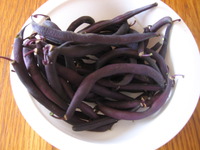 |
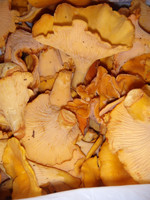 |
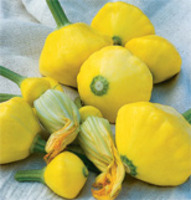 |
We’ve also re-instated our regular “Meet the Grower” table during the Thursday pickups. This Thursday, you’ll get to meet David Hoechst, owner of Dragonfly Farm. Their farm profile has this to say: “We have been growing organic produce for ourselves and family for 25 years. While a small operation, we have too much for just us. We’d like to share our bounty with more like minded people in the community.Everything we grow is something we enjoy and have found through the years to be good quality. We enjoy growing a variety of things including cucumbers, tomatoes, cabbage, watermelon, cantaloupe, squash, corn, okra, berries, flowers, and now have over 400 different daylilies.” While you’re waiting for us to fill your order, step up to his table and say hi!
Thanks so much for your support of Athens Locally Grown and everything we’ve tried to accomplish. With you’re help, we’ve been able to build something truly great and inspirational to people all across the country, more than you could know. Thank you also for your support of all of our growers, local food, and our rights to eat it. You all are part of what makes Athens such a great area in which to live. We’ll see you on Thursday at Ben’s Bikes at the corner of Pope and Broad Streets from 4:30 to 8pm!
Coming Events
Farmer for a Day: July 11, Sunday, at Veribest Farm (Oglethorpe County)
Certified Naturally Grown. We are pleased and grateful to find ourselves with enough of a patch of soil to participate in Athens Locally Grown and believe in the philosophy of thinking globally and eating locally. We believe in and strive for a sustainable lifestyle that includes growing fine vegetables produced without chemicals while conserving resources. This farm is approximately 33 miles from Athens, and it’ll take 50 minutes to get there. Space is limited, so please make reservations by adding them to your order. You’ll find it under the “Events Reservations” category on the website.
The Athens Farmers Market is held every Saturday morning at Bishop Park from 8am to noon and every Tuesday evening at Little Kings downtown. It’s a totally separate entity from Athens Locally Grown, but you’ll find many of the same growers at both. And of course, you can learn more about that market on their website.
Please support your local farmers and food producers, where ever you’re able to do so!
We thank you for your interest and support of our efforts to bring you the healthiest, the freshest and the most delicious locally-produced foods possible!
Availability for June 10
I generally spend an hour or so late Sunday evening looking through the Athens Locally Grown product listings, making a note of what’s new this week, finding some recipes that use those ingredients, and choosing one of those to share with you in my newsletter. Along the way, I make a few notes and then quickly type all that out into what I hope is a nice newslettery mailing for you that really just serves as the opening bell for market for the week.
I didn’t do that this week, though. We just had a heck of a thunderstorm move overhead, and I spent my hour with everything unplugged, sitting on the porch watching the lightning and listening to the thunder and the rain pouring on the tin roof. It’s come and gone, and I suppose I could pick up where I left off, but why not just open the market instead? There’s no sense keeping all of us up late, just so you can have one more recipe for squash, is there?
Tell you what… here’s one of my standbys. Right after I graduated college, a coffee shop opened up town. Besides the usual coffee shop drinks, Martha’s Black Dog served up a few simple but beautifully prepared dishes, and the place quickly became a favorite place to eat. This recipe for Steamed Eggs and Squash is one of her dishes that is still in my rotation today. It’s a great way to use up the overflowing basket of squash and zucchini, along with those eggs that are finally plentiful. Add a side of sauteed green beans and some crunchy toast, and you’ve got a fine meal suitable for breakfast, lunch, or dinner. And made 100% with items found through Athens Locally Grown (expect the olive oil, but I’m working on that).
1 zucchini and/or summer squash, cubed
5 eggs, beaten
½ cup soft cheese (cottage, fromage blanc, chevre, etc.)
salt and pepper
Sauté the squash in a tiny bit of olive oil until just heated through. Set up a double boiler (two nested sauce pans with an inch of water in the bottom will be fine). When the water comes to a boil, add the eggs, cottage cheese, and seasonings. Slowly stir constantly. When the eggs have just begun to set, add the squash. Cook a little bit less than you like them as they’ll finish cooking on the plate.
Some quick news: Our next Farmer for a Day event, on Sunday June 13, at Sundance Farm, has filled up. There are slots still available for our July, August, and September Farmer for a Day events, and you can find more details on the Market page of the website, under the Event Reservations category.
The Athens Farmers Market is held every Saturday morning at Bishop Park from 8am to noon and every Tuesday evening at Little Kings downtown. It’s a totally separate entity from Athens Locally Grown, but you’ll find many of the same growers at both. And of course, you can learn more about that market on their website.
Thank you for all of your support of Athens Locally Grown and our member growers. Without your patronage and demand for locally grown and naturally grown foods, the growers wouldn’t be here to meet that demand, and our entire community would be much worse off. Thank you! We’ll see you on Thursday from 4:30 to 8pm at Ben’s Bikes, at the corner of Pope and Broad!
Availability for June 3
To Contact Us
Our Website: http://athens.locallygrown.net
On Twitter: @athlocallygrown
On Facebook: http://facebook.com/athenslocallygrown
Recipes
Crushed Heirloom Potatoes
As with tomatoes, the profusion of heirloom varieties of potatoes at farmers’ markets has helped us rediscover them as a seasonal ingredient in a rainbow of flavors, colors, and textures. This recipe is the perfect vehicle for trying any number of them. Nutty, creamy La Ratte fingerlings are a favorite of French chefs. German Butterballs, as their name suggests, are soft and buttery. For even cooking, choose potatoes that are about the same size. From Bon Appetit, January 2005.
Serves 6 to 8
2 pounds unpeeled whole heirloom potatoes
3 ounces crumbled gorgonzola or blue cheese
1/2 cup pecans, toasted, chopped
1/4 cup extra-virgin olive oil
2 cups (packed) baby arugula
Place potatoes in large pot. Pour enough cold water over to cover; salt generously. Bring to boil. Reduce heat and simmer until potatoes are just tender, 20 to 40 minutes (depending on variety). Drain. Return potatoes to pot. Using large wooden spoon, coarsely crush potatoes in pot. Add cheese, nuts, and oil. Stir in arugula and toss to blend. Season to taste with salt and pepper. Transfer to bowl and serve.
Market News
Those of you who ordered last week got to see a number of changes to our order checkout system. Everything seemed to go really smoothly, wait times were cut way down, and there were a marked reduction in items that got lost and needed to be refunded back to you. I thought we might need a few weeks to get used to it all ourselves, but things just worked right off. If you missed it, here’s a summary of what’s new:
- We built an awning, and now (in good weather) both order pickup and payments all take place outside under the awning
- We’ve taken advantage of the new space inside to spread out more and arrange the grower’s items more effectively
- We chipped in for internet access at the building, and can now access orders on the website from a variety of devices
- We have two payment stations, each with an iPad looking at the website, who can take payments and mark items as missing or needing a refund right on the spot
I built a whole order checkout (and grower check in) system that lets us save nearly 200 pages a week that we had previously been printing. If we can get a grant or other funding for another 6 to 8 iPads, then the volunteers packing your orders can also use the checkout system so that the pay station will know in real time what’s in your basket and know exactly how much is due. We’ll be able to stop printing out individual invoices, saving us another 350 pages a week. It’ll take us a while to get to that point, probably, but where we are now is much better than where we were at even a month ago. And even better, all of the work I’ve put in to improving order processing is instantly available to all of the other 200 or so Locally Grown markets around the country. That makes managing the markets that much easier, and will help our little model spread further. And that puts more locally grown food on more plates across the continent, and that is good for everyone involved.
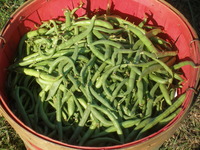 |
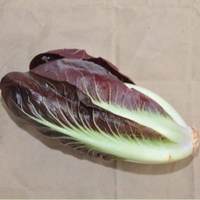 |
 |
We’ll also be re-instating our regular “Meet the Grower” table starting this week. This Thursday, you’ll get to meet Linda Johnson, owner of the Sylvan Falls Mill in Rabun Gap. Linda has sought out locally grown grains, especially the old-timey varieties, for use at her mill. That encourages those growers and shows others still that there is a market for small scale grain production, something that was once common here but has nearly been lost. You’ll get to learn about the mill, try some samples, and get a better idea of how important the secondary food producers like her are to our local food system. We’ll have other growers on hand for you to meet most weeks through the summer.
Many of you have asked about the status of the raw milk lawsuit. The wheels of justice turn slowly, and it’s all still in the courts, in the early stages. There has been some related news, though. LD Peeler, owner of Milky Way Dairy (one of the dairies who sold through us until last October), recently received a warning letter from the FDA accusing him of “causing to be delivered, selling, or otherwise distributing raw milk, in final package form for human consumption, in interstate commerce” all because some folks from Augusta were driving to his farm to buy milk. They seem to be telling him that he needs to verify that all of his customers are South Carolina residents, but LD says “I can’t determine where they’re from and I’m not going to.” I’ve got milk from LD’s cows in my refrigerator right now. The FDA thinks I’m committing a crime by driving to Milky Way farm (right up the highway and across a bridge from my house), buying milk in a manner that is legal for everyone in South Carolina, and then bringing it back to my home. The FDA has been to my house and seized my milk without a warrant before, but I guess they don’t want to put inspectors on all the bridges to stop everyone doing this, so they’re telling LD that he has to act as policeman. One of the aims of our lawsuit is to put an end to this madness. You can learn more about the letter, and LD’s reaction, at the excellent weblog on raw milk matters The Complete Patient.
We’ll go out on that note. While you’re remembering all of the fallen soldiers who have given everything to protect the freedoms we have, also remember that those rights are always under threat. It hasn’t yet come to government inspectors searching cars as they leave a farm, but the FDA has testified in court that they have the right to do so, and that we do not have the right to any particular food. Thanks so much for your support of Athens Locally Grown and everything we’ve tried to accomplish. With you’re help, we’ve been able to build something truly great and inspirational to people all across the country, more than you could know. Thank you also for your support of all of our growers, local food, and our rights to eat it. You all are part of what makes Athens such a great area in which to live. We’ll see you on Thursday at Ben’s Bikes at the corner of Pope and Broad Streets from 4:30 to 8pm!
Coming Events
Farmer for a Day: JUNE 13, Sunday, at Sundance Farm (Madison County)
Certified Naturally Grown. We are a family farm growing a diverse variety of vegetables, herbs, flowers, fruits and berries. We also raise chickens, heritage turkeys and goats. Our three children are the heart of our farm. They enjoy the healthy food they help harvest and realize what it takes to get from a seed to the table. We are Certified Naturally Grown and have sold produce in the Athens area since 1998. Currently we sell at Athens Locally Grown, Athens Farmers Market, local restaurants and from the farm. We are also planning a C.S.A. in the near future. We appreciate all the Locally Grown customers that have supported us through the years, allowing us to do what we love, Growing good food. This farm is approximately 13 miles from Athens, and it’ll take 20 minutes to get there. Space is limited, so please make reservations by adding them to your order. You’ll find it under the “Events Reservations” category on the website.
The Athens Farmers Market is held every Saturday morning at Bishop Park from 8am to noon and every Tuesday evening at Little Kings downtown. It’s a totally separate entity from Athens Locally Grown, but you’ll find many of the same growers at both. And of course, you can learn more about that market on their website.
Please support your local farmers and food producers, where ever you’re able to do so!
We thank you for your interest and support of our efforts to bring you the healthiest, the freshest and the most delicious locally-produced foods possible!
Availability for May 27
To Contact Us
Our Website: http://athens.locallygrown.net
On Twitter: @athlocallygrown
On Facebook: http://facebook.com/athenslocallygrown
Recipes
Coleslaw with Cilantro and Chives
There is almost nothing better to do with a young, fresh head of cabbage than to make it into a fluffy slaw. It’s refreshing on a hot summer’s day and pairs nicely with all kinds of fresh raw vegetables. Here we simply accent the cabbage with cilantro and chives, but you can add julienned carrots, bell peppers, celery, or whatever crunchy fresh vegetable you like. From Farmer John’s Cookbook: The Real Dirt On Vegetables.
Serves 8 to 10
4 to 6 cups shredded cabbage (green, red, or a combination) (2 to 3 small heads)
1/4 cup minced cilantro
1/4 cup chopped chives
3 tablespoons extra virgin olive oil
3 tablespoons white wine vinegar
2 tablespoons sugar
1 teaspoon salt
1. Toss the cabbage, cilantro, and chives in a large bowl or container; refrigerate, covered, for at least 1 hour or overnight.
2. When ready to serve, mix the oil, vinegar, sugar, and salt in a small bowl until well combined. Pour the dressing over the chilled cabbage mixture. Mix well just before serving.
Market News
It’s an exciting week on the availability list, for quite a few reasons. The first might seem a bit mundane, but for me it means I no longer have to buy three staples at the grocery store (just about the only produce I’ve had to buy outside of Athens Locally Grown for months). I’m talking about potatoes, onion bulbs, and garlic. I’ve run out of fresh garlic quite a ways back, and I just haven’t gotten the hang of storing potatoes and onions through the winter, and I go through a lot of all three of them in my kitchen. The friendly produce man at Ingles will miss seeing me, I’m sure. Another things people have been asking about for years has also arrived for the first time this week: chicken packaged by cuts. If getting a whole chicken wasn’t your thing, you can now get packs of legs, thighs, wings, and breasts from Greendale Farm. Buying a whole bird is always cheaper, of course, but I know there have been several times when I wished I could get a pack of thighs for a certain recipe I’m fond of. Now, I can!
There are a number of other notable items to look for: a Gruyere cheese from Nature’s Harmony, a summer granola mix from Mertie’s Oven, more types of tomatoes, summer squash, lots of leeks, loads of basil, and more. We’re over 1000 items all told this week, more than you’ll find at any of the traditional farmers markets in the area. You’ve got a great opportunity to experiment with things you’ve never tried before, and to try many different varieties of something you already like, to find your favorite. All this variety is a great way to turn mealtime into more than just a way to get energy into your body, to make it an adventure. And kids enjoy taste tests! “I don’t like turnips” they may say, but then you might tell them “You’ve only had purple tops. Here is a Hakurei turnip from Japan that tastes completely different, and here is a Gold Ball from Scotland that is different again.” And the exploration begins!
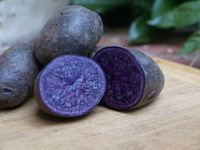 |
 |
 |
Filling and organizing orders with our new shelving system went really smoothly last week. The volunteers are able to spread things out and find what they need much faster than before. The growers are still getting used to it, but they seem to like the extra space too. So, this week we’ll change things even more by moving the pickup tables and the pay stations outside. Yesterday, Roseanne Hutchinson, Tom Reynolds, and I built a large awning attached to the wall of the building. It’s 40 feet by 18 feet, and gives us more room for you than you had inside. We plan on having two pay stations too, to make payment go faster for us all. So, you can hang round and socialize as long as you want to without feeling like you’re holding up the flow, and we can spread things out inside even more. Of course, if you want to come on in and take a look at things, feel free! If it storms on a Thursday, we can move us all back inside, but when it’s nice… plenty of room! This will also allow us to more easily plan social events during the Thursday pickups, like regular “Meet the Grower” tables, music, hosting the Farm 255 farm cart, and so on.
Thanks so much for your support of Athens Locally Grown and everything we’ve tried to accomplish. With you’re help, we’ve been able to build something truly great and inspirational to people all across the country, more than you could know. Thank you also for your support of all of our growers, local food, and our rights to eat it. You all are part of what makes Athens such a great area in which to live. We’ll see you on Thursday at Ben’s Bikes at the corner of Pope and Broad Streets from 4:30 to 8pm!
Coming Events
Farmer for a Day: JUNE 13, Sunday, at Sundance Farm (Madison County)
Certified Naturally Grown. We are a family farm growing a diverse variety of vegetables, herbs, flowers, fruits and berries. We also raise chickens, heritage turkeys and goats. Our three children are the heart of our farm. They enjoy the healthy food they help harvest and realize what it takes to get from a seed to the table. We are Certified Naturally Grown and have sold produce in the Athens area since 1998. Currently we sell at Athens Locally Grown, Athens Farmers Market, local restaurants and from the farm. We are also planning a C.S.A. in the near future. We appreciate all the Locally Grown customers that have supported us through the years, allowing us to do what we love, Growing good food. This farm is approximately 13 miles from Athens, and it’ll take 20 minutes to get there. Space is limited, so please make reservations by adding them to your order. You’ll find it under the “Events Reservations” category on the website.
The Athens Farmers Market is held every Saturday morning at Bishop Park from 8am to noon and every Tuesday evening at Little Kings downtown. It’s a totally separate entity from Athens Locally Grown, but you’ll find many of the same growers at both. And of course, you can learn more about that market on their website.
Please support your local farmers and food producers, where ever you’re able to do so!
We thank you for your interest and support of our efforts to bring you the healthiest, the freshest and the most delicious locally-produced foods possible!